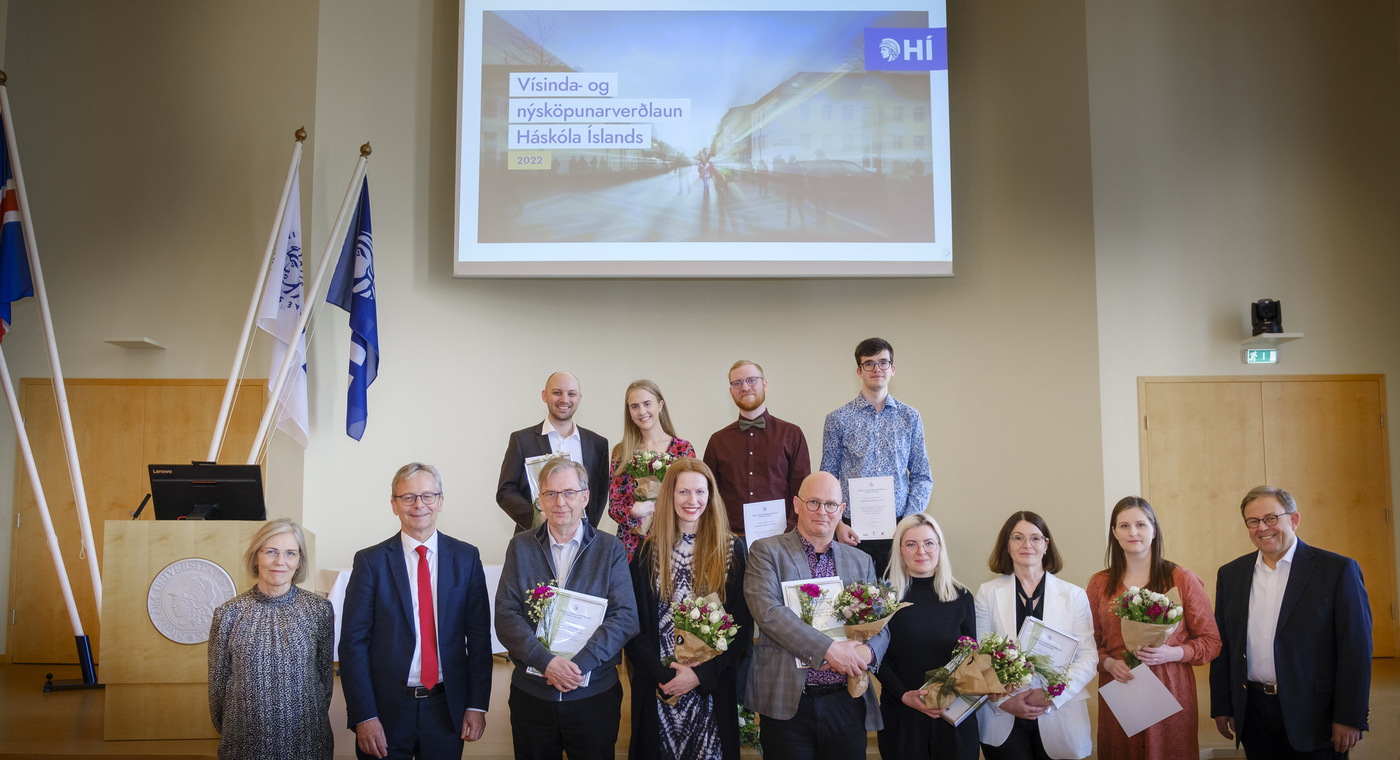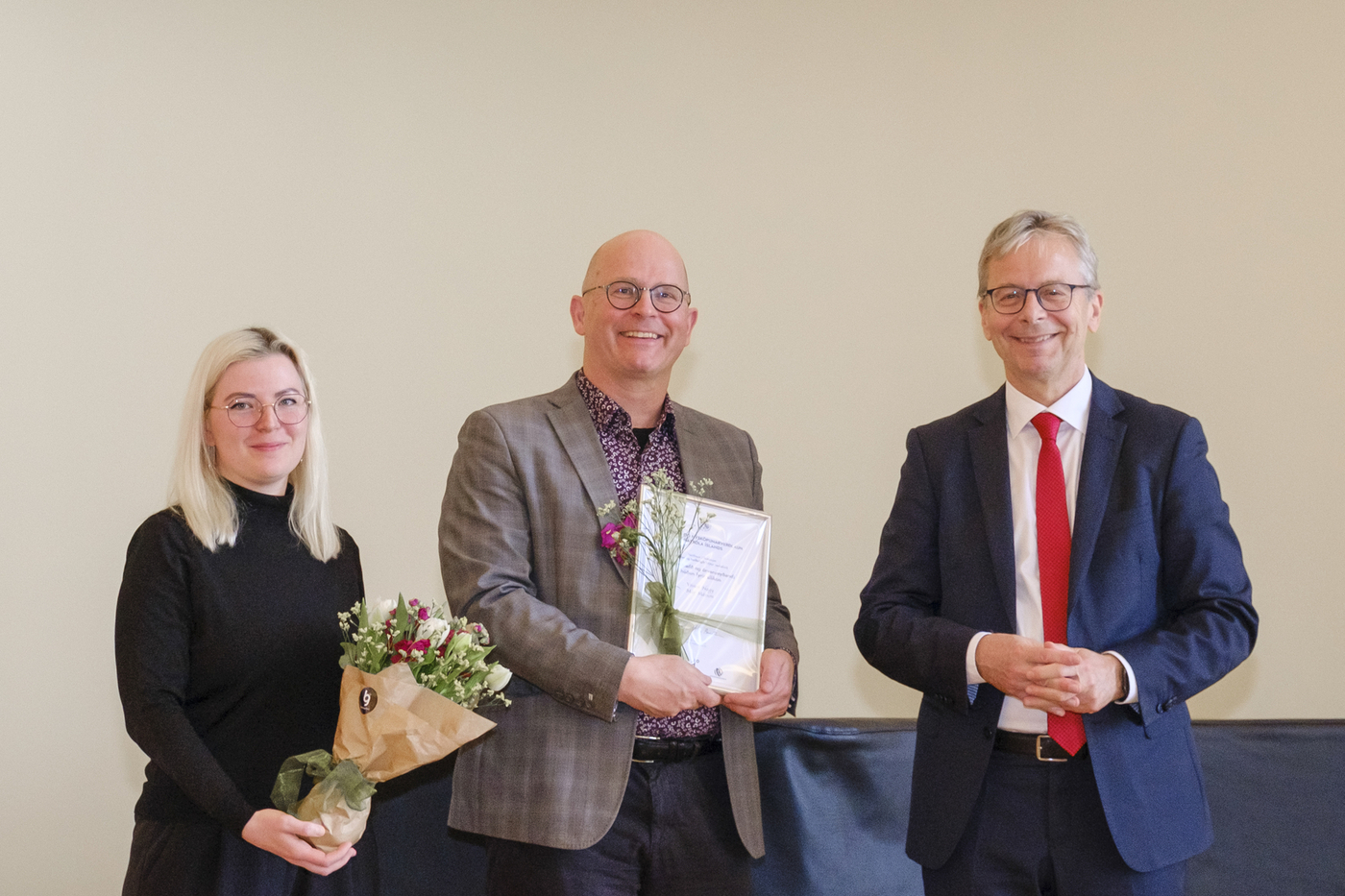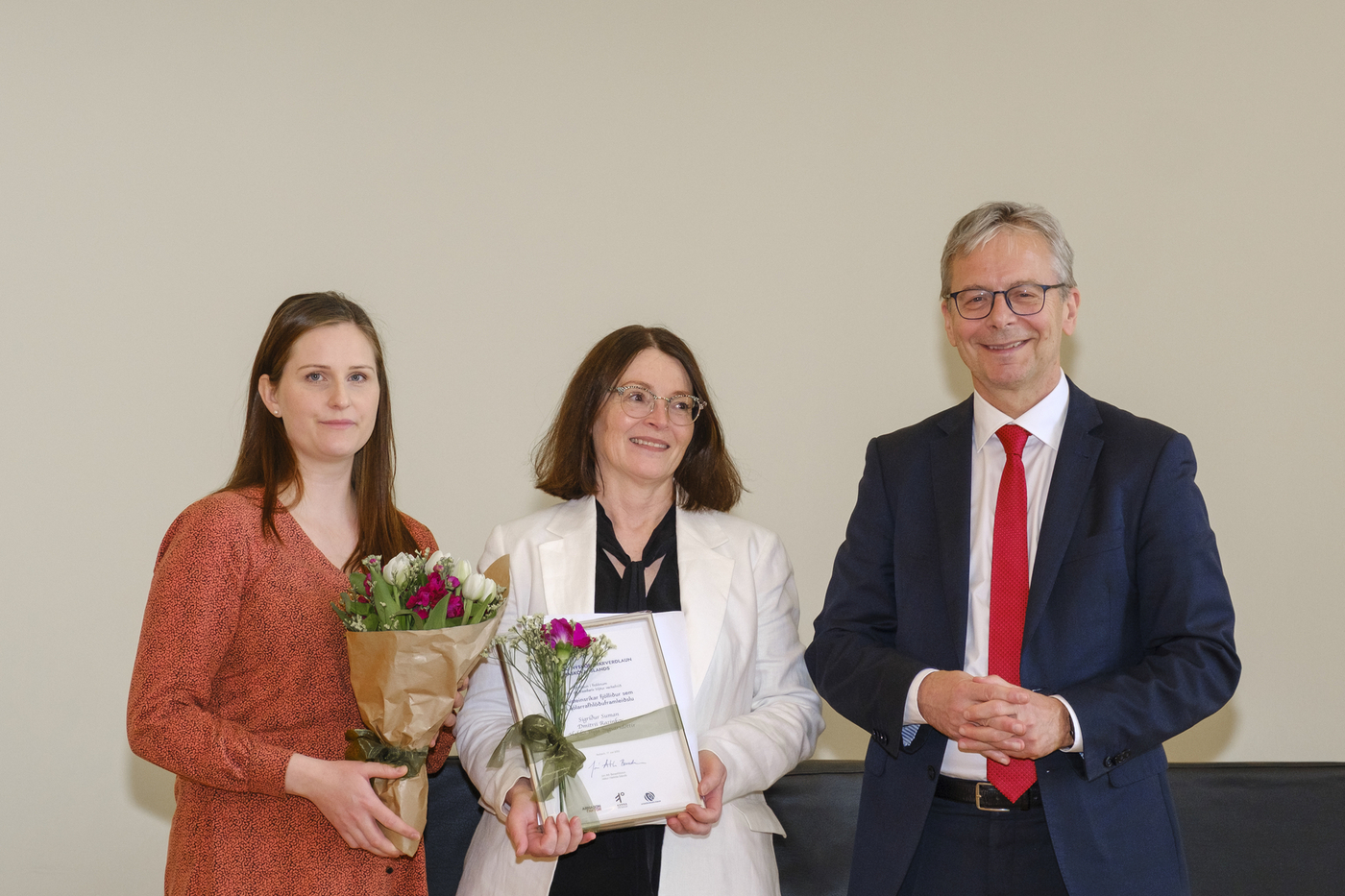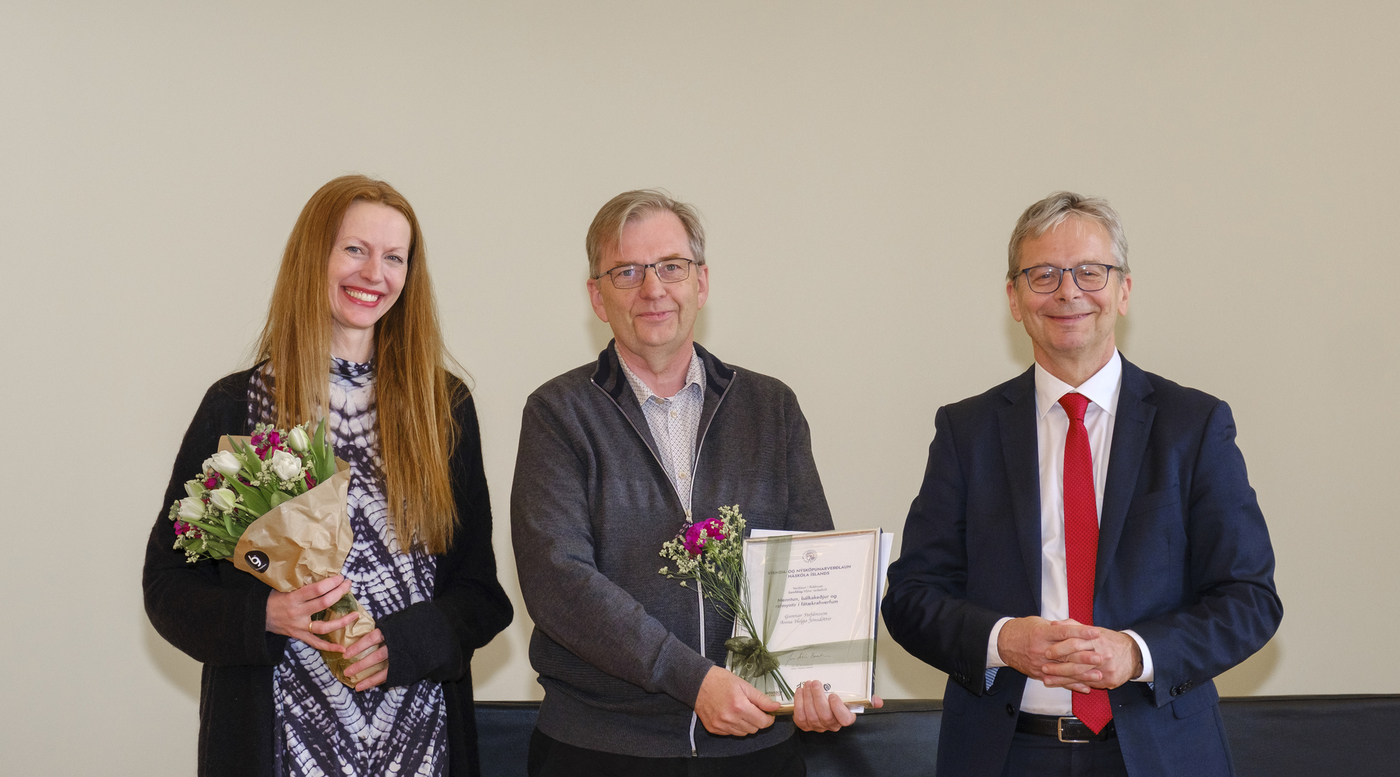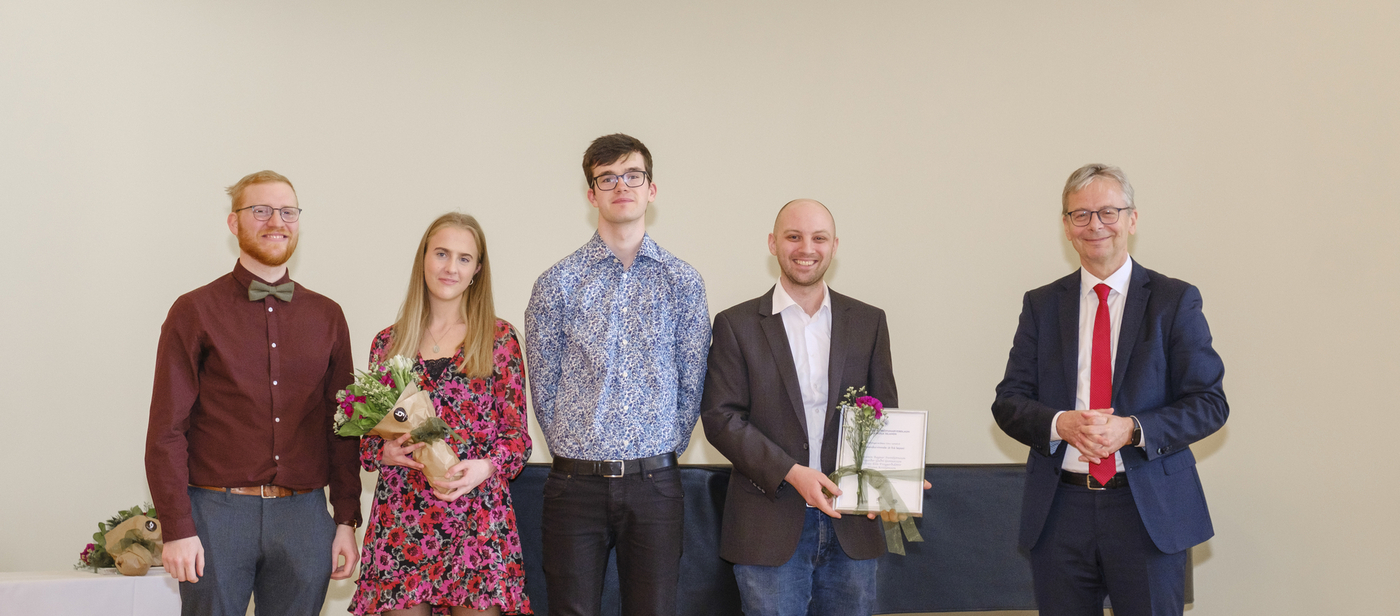A new method developed by scientists at the University of Iceland, intended to prevent serious infections on the surface of silicon implants and artificial joints, was the overall winning entry in the annual competition for the Science and Innovation Prizes, which took place in the University Aula today. The team have applied for a patent for the technology, which was developed in collaboration with the companies Össur and Primex. Three other projects by UI staff and students also won prizes at today's event: one centred on development of a new kind of adhesive to improve the energy performance of solar batteries; one about helping students in the world's poorest regions to access higher education; and one focused on a new method for separating polymers in plastic, with the goal of allowing more kinds of plastic to be recycled.The competition for the University of Iceland Science and Innovation Prizes has been held annually for over 20 years, under various different names. This year there were 27 entries. A panel of judges, made up of experts from within and outside the University, reviewed the entries and evaluated them based on ingenuity and originality, execution, societal impact (e.g. with regard to the UN Sustainable Development Goals), and whether the project aligned with the University's strategy and mission.
Prizes were awarded for the best ideas in four categories: Health and wellbeing, Technology and progress, Society and the Motivational Prize. An overall winner was also selected from the winners in the above categories.

Vivien Nagy and Már Másson, the people behind the project, with Jón Atli Benediktssyni rector.
The winner of the category Health and wellbeing, and the overall winner of the competition, was the project Biocompatible and antimicrobial plating for silicon. The total prize money awarded to this project was ISK 3 million. The project presents a new method for creating a plating for silicon implants and artificial joints. Silicon is widely used in medical devices, for example in artificial joints, cardiac valves, port-a-caths and catheters. As a material, it has many good qualities, but its main downside is that bacteria and fungus form on the surface, which can lead to infection. Such infections can be life threatening and require the use of antibiotics, longer hospital stays and increased costs for the patient and wider society.
The panel of judges believed that this project had enormous practical potential and demonstrated considerable ingenuity. These kinds of infections are a known problem in healthcare and the project could bring significant benefits to affected patients, as well as society as a whole. "This project is a brilliant example of how collaboration between the University of Iceland and industry can generate new knowledge and promote advances that benefit our society," said the judges in their statement.
The people behind the project are Vivien Nagy, PhD student in pharmacy, and Már Másson, professor in the same discipline. They have already applied for a patent in collaboration with the Intellectual Property Committee of the University of Iceland and Landspítali University Hospital and the Technology Transfer Office. They are also thinking about founding a start-up company in order to further develop and market their invention. The project was completed in collaboration with Össur and Primex.

Hafdís Inga Ingvarsdóttir and Sigríður Suman, the women behind the award winning project Sulphur rich polymers as adhesive in solar battery manufacturing with the Rector.
The winner of the Technology and progress category, awarded a prize of ISK 1.5 million, was the project Sulphur rich polymers as adhesive in solar battery manufacturing. The project is about development of a new adhesive that could improve the energy performance of solar batteries by up to 30%. "Energy performance depends to a significant degree on the refractive index of the adhesive used to glue together parts of the battery. The current adhesive on the market has a refractive index of up to 1.4, but this new adhesive has a refractive index of 1.8. The maximum feasible refractive index is 2.0." The team is in the process of applying for a patent for the invention. They will test the adhesive and are already talking with interested companies about how to harness this technology.
The judges pointed out in their statement that this project is highly practical and also likely to yield enormous benefits for society, since we have a lot to gain from improving sustainable energy efficiency. The project is an excellent example of collaboration between the University of Iceland and other Icelandic and international institutions.
The people behind the project are Sigríður Suman, professor of chemistry, Dmitrii Razinkov, PhD student in the same discipline, and Hafdís Inga Ingvarsdóttir, who graduated with an MS in chemistry in 2018. The project was completed in collaboration with Esteban Meja from the Leibniz Institute for Catalysis in Rostock, Germany and Gissur Örlygsson from IceTec.

Anna Helga Jónsdóttir and Gunnar Stefánsson, the people behind the award winning project, Education, blockchains and cryptocurrency in low-income regions, with the Rector.
The ISK 1.5 million prize for the best entry in the Society category went to the project Education, blockchains and cryptocurrency in low-income regions. The aim of the project is to help students in some of the world's poorest regions access higher education. The project is based on tutor-web, a mathematics teaching system which was developed at UI, and the cryptocurrency SmileyCoin, which was developed as a reward system for students. The non-profit organisation Education in a Suitcase raises funds, primarily through grants, and buys tablets to donate to libraries in Kenya. The libraries then loan the tablets to students who can study using the tutor-web system. When students complete certain exercises, they are rewarded with SmileyCoin, which they can use to buy the tablet if they complete all the mathematics material for the Kenya Certificate of Secondary Education, or various goods in little 'shops' inside the libraries, e.g. food, scratch cards for data storage, and period products. The decision to move the tablets to the libraries, instead of having them in schools, and offering the chance to buy food has encouraged many more students to take part in the project and boosted the numbers of girls studying in Kenya.
"The judges believe that this project aligns well with the UN Sustainable Development Goals. This is a much-needed initiative and an original way to promote education among vulnerable populations," said the judges' statement, which also points out that the entrants showed considerable tenacity in developing the project, which has led to a new and effective approach.
The judges also argued that the project is an excellent example of broad collaboration focused on delivering benefits to the community. 20 libraries, schools, orphanages and refugee camps in Kenya are involved with the project, as well as numerous organisations and institutions working in the country, such as AfricanMaths Initiative, Stratmore University, Maseno University, Challenge Aid, Windle International Kenya, ABC Barnahjálp, Íslenska Barnahjálpin, Shuttle Thread, the Sliding Through Foundation, and 40 charities that now take funding in SmileyCoin.
The project is the work of Gunnar Stefánsson, professor of mathematics, and Anna Helga Jónsdóttir, senior lecturer in the same discipline, as well as a large number of UI students over the last 20 years.

Sigurður Guðni Gunnarsson, Sólrún Elín Freygarðsdóttir, Hreinn Kristjánsson and Benjamín Ragnar Sveinbjörnsson, who received the motivational prize for the project Plastic recycling based on solubility.
The Motivational Prize of ISK 500,000 was awarded to the project Plastic recycling based on solubility. The project is based on a new method for separating polymers in plastic by type and size. This method makes it possible to sort and recycle more kinds of plastic. This could help the plastics industry and wider society to reduce the amount of plastic waste that ends up in landfill, in our oceans, or incinerators. Currently only some plastic waste is actually recycled.
The judges argued that this project could have an enormously positive impact on society and that this was a new and exciting approach to genuine problems in the recycling sector. The project also aligns with the University's strategy and mission.
Behind the project are Benjamín Ragnar Sveinbjörnsson, lecturer in chemistry, Sigurður Guðni Gunnarsson, PhD student in the same discipline, Solrún Elín Freygarðsdóttir, BS student in the same discipline, and Hreinn Kristjánsson, who graduated with a BS in chemistry in 2021. They are thinking about collaborating on the project with other organisations in Iceland.
The competition for the University of Iceland Science and Innovation Prizes is run as a collaboration between the University of Iceland, the New Business Venture Fund, Árnason|Faktor and the Technology Transfer Office Iceland.




